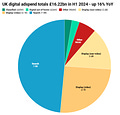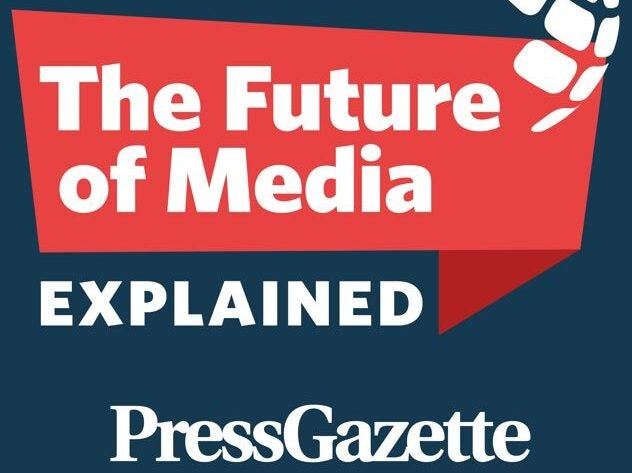Why publishers are yomping to Youtube | Where we are with gen AI in newsroom
And Jim Chisholm explains why he thinks Guardian journalists would be wrong to go on strike in protest at the sale of The Observer.
Good morning and welcome to your Press Gazette Future of Media newsletter on Thursday 31 October, brought to you this week in association with Mather Economics – trusted by leading publishers worldwide for holistic revenue strategies and cutting-edge analytics. Find out how The Philadelphia Inquirer, a leading US publisher, optimised its digital subscription strategy with AI, driving a 35% boost in paywall subscriptions while streamlining operations.
From Times Radio to the Daily Mail, publishers are making a beeline for Youtube in search of video advertising.
The latest figures from the Internet Advertising Bureau explain why. In the first half of 2024 the IAB estimates video display advertising grew 26% year on year to be worth £4.1bn in the UK. That makes video now far bigger than regular online display ads, which were worth £2.4bn in the first half.
Alphabet this week revealed overall ad revenue up 12% at Youtube to £8.9bn in the last quarter alone. As always when it comes to online media, the biggest winners are the tech platforms which control the plumbing. But publishers are increasingly seeing the 45-55% revenue share kickback from Youtube ads as worth having.
Google's search advertising revenue alone in the UK was more than £7bn in the first half. Sadly it doesn't share any of that with the publishers whose content it relies upon.
It rounds up most of the known use cases of the technology in content production and concludes that the tech can deliver lots of small efficiency gains but is not a total game-changer for publishers.
I strongly suspect there is a lot more AI being deployed in content production than publishers currently admit (or maybe even know, given that some may be happening under the counter). Anyone who spends any time browsing through Google Discover on their phone will see plenty of made-for-advertising content from reputable publishers which reads like it was written by AI in their feed.
And we have a view from veteran media analyst Jim Chisholm on the prospect of Guardian and Observer journalists going on strike in protest at Tortoise Media's bid for The Observer. Print newspapers currently have a half-life of six years, he notes, meaning the Tortoise plan may be the best option for the brand's long-term survival.
**BREAKING NEWS** GB News fined £100k by Ofcom.
From our sponsor:
Are you maximizing the full revenue potential of every reader? Purpose-built for news publishers, Sophi’s AI-powered solutions are your strategic advantage in today's fast-evolving landscape.
By blending advanced technology with Mather’s deep industry expertise, Sophi unlocks sustainable growth while supporting your journalistic mission.
Sophi’s Dynamic Paywall Engine is designed to:
Optimise paywall decisions for maximum revenue
Empower teams with unmatched efficiency
Seamlessly integrate with your tech stack
And scale to meet your goals.
Read how the Philadelphia Inquirer achieved a 35% lift in paywall subscriptions with Sophi.
On Press Gazette
Adspend growth shows why publishers are going big on video
New IAB UK and Media Sense data reveals why publishers are investing more into video.
How publishers use AI to boost productivity: From audio editions to exploiting archives
Enders Analysis says tech is helpful but not game-changing for publishers.
Guest comment: The Observer has a half-life of six years, Tortoise deal is best option for brand and staff
Jim Chisholm: “The decision to divest The Observer – in such favourable terms, for the company and the staff involved – seems to me an obvious strategic move.”
How publishers can escape email boxes and embrace automation (promoted)
“Where before they were taking content via email, often in dribs and drabs with back-and-forth messages to sort it all out now they receive it through a streamlined submission process, quietly pushing responsibilities back on the advertiser.”
Why news publishers should not give up on print (promoted)
”The management of media companies has identified that having a strong paper also strengthens and brings credibility to the digital product.”
Press Gazette highlights
Guardian endorsement of Harris reaps it near $2m boost after editor’s email
Culture Secretary Nandy promises ‘level playing field for local media online’
Washington Post’s non-endorsement could cost title $20m+ in lost online subs
Spiked Washington Post election leader leaves CEO Will Lewis in a deep hole
Keir Starmer: AI companies should pay publishers for content
Guardian Media Group journalists back strike in indicative vote on Tortoise Observer bid
British Journalism Awards 2024: Full list of this year’s finalists
Farrah Storr: Why less can be more when selling online content
Business and specialist titles opt for Flip-Pay to power paid content (promoted)
Latest podcast
Election endorsements, revolting Guardian journalists and regulating AI
Press Gazette editor-in-chief Dominic Ponsford and reporter Bron Maher provide an insider take on three of the hottest issues in news media: how did the Washington Post handle its election endorsement so badly? Why are Guardian and Observer journalists set to go on strike? And what can publishers do about the onslaught of generative AI bots harvesting their content without permission?






